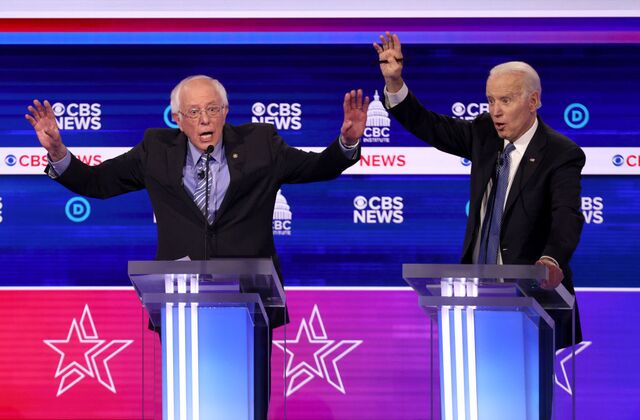How and when to relate to the Democratic Party? It’s a vexing question, one that members of DSA spend a lot of time thinking about. In 1896 the People’s Party, a populist formation, joined the Democratic Party and was quickly subsumed. In the 1930’s the labor union bureaucracy kept workers in the Democratic Party, in spite of millions of workers clamoring for a labor party. In Minnesota the Farmer-Labor Party merged with the Democratic Party and lost itself. The historical record of operating inside the Democratic Party doesn’t bode well for those who try.
That said, Bernie Sanders opened up a new chapter in the experiment in 2016. He ran an historic campaign for President completely inside the party. The result was a massive popularization of socialist ideas and tens of thousands streaming into DSA, making it one of the largest socialist formations in US history. By 2021 dozens of DSA members were running and winning political office, most often inside the framework of Democratic primaries. While there has been a rightward pull on some, like Jamal Bowman, many DSA office holders have helped lead campaigns, recruited to DSA and gone toe-to-toe with the forces of capital. They have built working-class power in the process. It’s a tactic that can’t be thrown out, at least not right now.
The corporate wing of the Democratic Party views these developments with fear and hostility. In 2016 and 2020 they used all their power, influence and connections to sink Bernie. They torpedoed Keith Ellison’s effort to become DNC Chair in 2017 and Donna Cassett’s progressive run for DFL State Chair the same year. National forces were marshaled to take out Nina Turner in Ohio and India Walton in Buffalo. Locally, the DFL revoked VAN* access for Minneapolis City Council Member Robin Wonsley-Worlobah’s campaign at a crucial point, attempting to sink her campaign. (*Ed Note: VAN = Voter Access Network, a nationwide database crucial to electoral campaigns. It is co-owned by a private company, a non-profit, and the Democratic Party.)
The DFL establishment is hostile to the aims of DSA, workers and progressive movements. Most recently, we witnessed the defeat of an application for a Democratic Socialist Caucus in the DFL, led by Party Chair Ken Martin. During the Fight for 15, city councils in both Minneapolis and St. Paul (where there were only Democrats and one Green), were vehemently opposed to a $15 minimum wage. It was only after strong grassroots movements had been built that they were forced into voting for it. This is because corporate interests have considerable influence over these politicians through donations and personal connections. The same scenario played out on a state and national scale around Medicare For All, the Green New Deal, cancellation of student debt, the $15 minimum wage, union rights, public safety and more. And for the same reason: corporate influence on Democratic elected officials.
In the last few months we have witnessed Biden’s Build Back Better and voting rights agenda fail miserably, with the president relying completely on back-room discussions with Senators Sinema and Manchin. In the meantime Donald Trump has been building a grassroots movement for a reactionary, fascist-like agenda. Biden and the party establishment are terrified of building a mass movement because they desire stability for the monied class at all costs. By their weakness and vacillation they grease the skid towards an extreme right takeover.
Shouldn’t we be building an independent, mass working-class movement and fielding candidates who are deeply embedded in the movements for rent control, GND, public safety and unions? Isn’t the best way to attract workers angry at the system and DFL members disaffected with their party to build successful movements for change like the fight for 15? We can spend enormous amounts of energy and resources on reforming or taking over the DFL, a political party that hates our ideas, or we can build a political pole of attraction that leads away from corporate domination, even if that means some presence within DFL institutions.
These will become increasingly important questions. The DFL establishment for its part will argue that unions, socialists and workers should work hard to elect corporate Democrats because the Republican candidates are so disgusting and reactionary. That may be true, and I’m sure many DSA members will vote for Gov. Walz over the Republican nominee for that reason. But we can’t allow ourselves to get sucked into the machinery. We need to stay focused on winning rent control in the Twin Cities and supporting the increasing number of workers going on strike or who want a union. We need to focus on getting our four DSA-endorsed candidates for state legislature elected and helping them resist a pull to the right.
There are already those on the left who are being pulled into the DFL orbit by the arguments raised above. In the January issue of Southside Pride, editor Ed Felien, a DSA member, calls on DSA members and others to give time and money to whomever the DFL candidate is in the 1st Congressional District in southern Minnesota. There is no mention of giving time and money to our DSA-endorsed candidates. Contrary to the political line of the DFL, which says “stick with us and we will push the right back by moving to the right”, if you want to stop fascism and beat back the right, the best thing to do is build an independent multi-racial working-class movement fighting for a transformation of society.
By Kip H.

